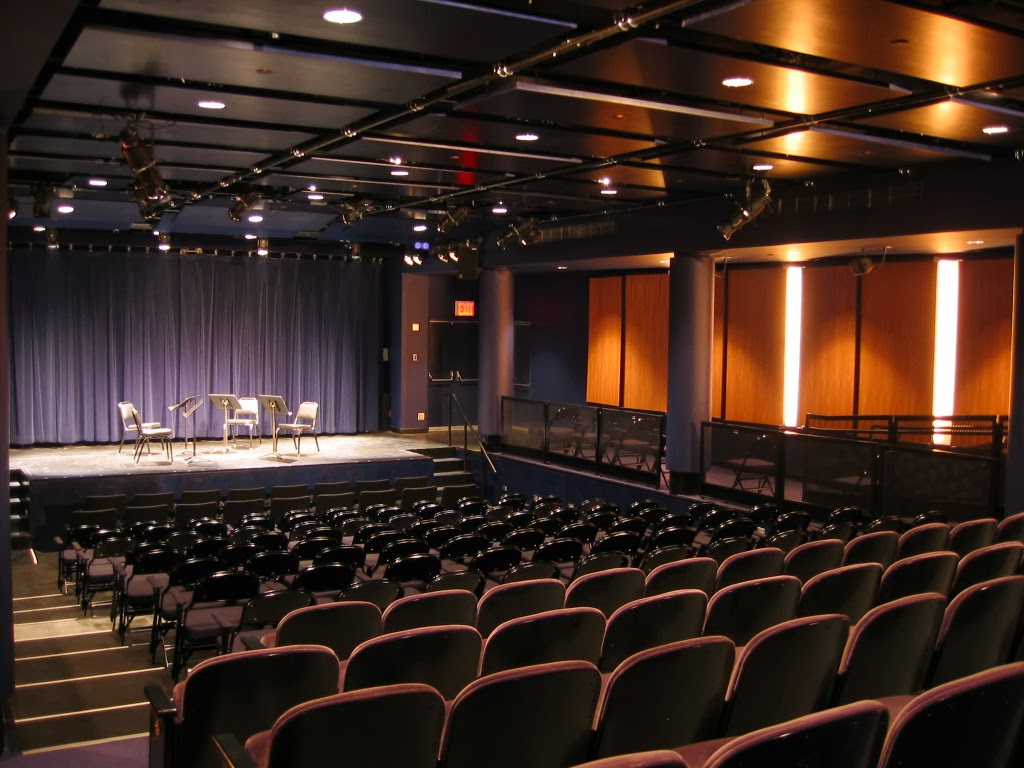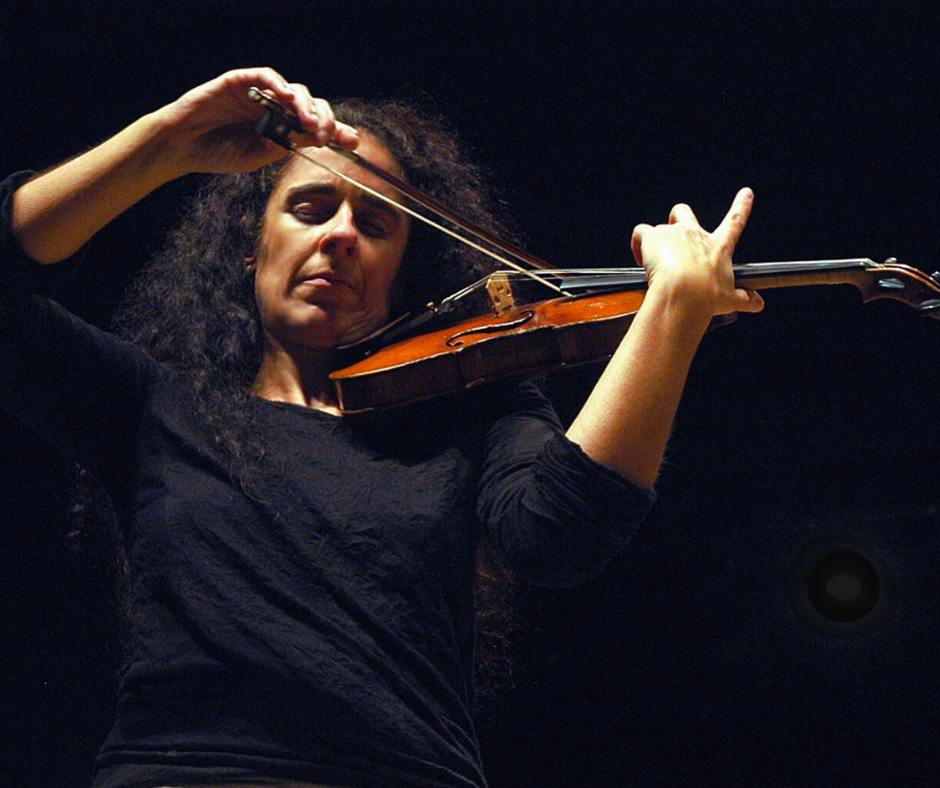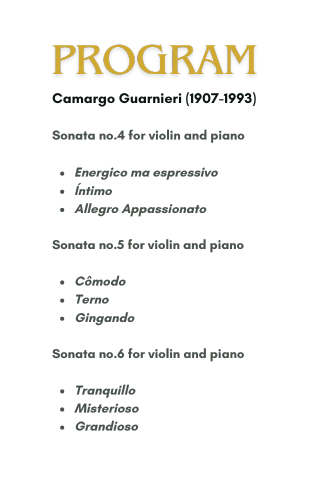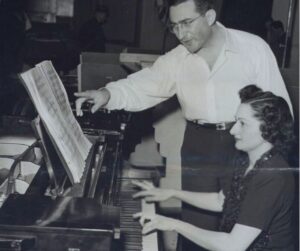JOIN US!
On April 25, the Leonard Nimoy Thalia Theater at Symphony Space in New York will host a remarkable concert featuring violinist Tânia Camargo Guarnieri and pianist Max Barros, performing the Violin Sonatas Nos. 4, 5, and 6 by the celebrated Brazilian composer Camargo Guarnieri. This event is a rare and significant tribute to one of Brazil’s most important musical voices, bringing together two artists deeply connected to his legacy.
As the composer’s daughter, Tânia Camargo Guarnieri carries an intimate, personal understanding of her father’s music, while Max Barros, renowned for his dedication to recording Guarnieri’s complete piano works, brings an unmatched depth of interpretation. Their collaboration offers a profound and authentic exploration of these sonatas, celebrating the richness of Brazilian classical music and ensuring that Guarnieri’s work continues to inspire new generations.

April 25th, 2025
@ 8pm
Leonard Nimoy Thalia,
250 West 95th Street, Symphony Space, NYC
TICKETS
Click here for Google map!
The Brazilian Music Foundation is a 501 (c) (3) non-profit organization. Donations in the U.S. are tax-deductible.
Performers

Tânia Camargo Guarnieri
Tânia has been performing throughout Brazil as a recitalist, chamber musician, and soloist with several orchestras, including the São Paulo Symphony Orchestra, Belo Horizonte Symphony Orchestra, Paraná Symphony Orchestra, Brazilian Symphony Orchestra, and Petrobrás Symphony Orchestra, under important conductors such as Eleazar de Carvalho, Camargo Guarnieri, Ernst Mahle, Alessandro Sangiorgi, János Ács, and Maurice Peress.
She has recorded Camargo Guarnieri’s Sonatas for Violin and Piano with pianist Laís de Souza Brasil, Paganini works with guitarist Marco Pisoni among others.
In recent years, in addition to her career in her native country and Italy, she has performed in various countries, including Israel, Hungary, Spain, France, Germany, the United States, Portugal, Syria, Albania, and Serbia. Residing in Italy since 1996, she plays a Carlo Bergonzi violin from 1733.
“The violinist’s touching interpretation, without excesses, conquered the audience, as well as Guarnieri’s wonderful piece.”
—Gazeta do Povo, Curitiba
“The six Camargo Guarnieri Sonatas for Violin and Piano, … were played with rich sonorities and mystery.”
— Folha de São Paulo

Max Barros
Hailed by the critics for his elegant playing (The New York Times) and for his unfaltering brio (Gramophone), Max Barros has won wide acclaim as one of South America’s foremost pianists. Born in California and raised in Brazil, Mr. Barros was presented with the “Soloist of the Year” Award (1985) by the São Paulo Music Critics Association for his performance of Brahms’ Piano Concerto in D minor with the São Paulo Symphony Orchestra (OSESP).
Mr. Barros has recorded for Naxos the complete Piano Concertos by Camargo Guarnieri with conductor Thomas Conlin and the Warsaw Philharmonic, which won the “Discovery Award” from the Diapason magazine in France and is currently recording the complete solo piano works by Guarnieri in six volumes.
Max Barros is a Steinway artist.
“Barros is a first-rate artist, with technique to spare [and] performs with clarity and sensitivity.”
— St. Louis Post-Dispatch
“Barros is just right for this music: deeply versed in Guarnieri’s idiom, he plays with confident brio and sensitivity and far overshadows other recordings I’ve heard of Guarnieri’s piano pieces.”
— American Record Guide
Camargo Guarnieri (1907-1993)
The brazilian composer and conductor, Camargo Guarnieri, was born on February 1, 1907 in Tietê, São Paulo, Brazil. He was well known for composing “Rebelião em Vila Rica” (1957), “O Trem Caipira” (1994), and “A Casa de Mário de Andrade” (1955).
An esteemed teacher, conductor and composer, Camargo Guarnieri (his complete name is actually “Mozart Camargo Guarnieri” – his father gave famous composer’s names to all his sons) was one of the dominant figures in Brazilian music in the 20th century.
Some of his compositions received important prizes in the United States in the 1940s, giving Guarnieri the opportunity of conducting them in several cities like New York, Boston, Los Angeles, and Chicago. In Philadelphia he won the first prize for the Free Library Fleischer Music Collection for his Violin Concerto, and a prize from the Chamber Music Guild of Washington, D.C., in 1944, for his second String Quartet. He was a direct descendant of the Guarnieri family, violin makers of Cremona.
He was made a life member on the foundation of the Academia Brasileira de Música in 1945, and in 1960 was appointed director of the Conservatório Dramático e Musical in São Paulo. His œuvre comprises symphonies, concertos, cantatas, two operas, chamber music, many piano pieces, and over fifty songs.
Even though he remained a devoted nationalist throughout his career, Guarnieri also absorbed European elements during his period of studies in Paris, where he worked with Koechlin. He returned to Brazil at the outbreak of World War II, and shortly thereafter went to the United States on an invitation from the Pan American Union.
As a conductor, he appeared with most of the leading European and American orchestras, and continued to play a leading role in orchestral and choral organizations in Brazil until his death.

Production team
Brazilian Music Foundation
Madalena Sousa: Founder/President/CEO
Max Barros: Vice-President/Artistic Director Classical Music
Supporters/sponsors:
Asuos Productions
Bossa Magazine
WKCR 89.9 FM
BPA (Brazilian Professional Abroad)





